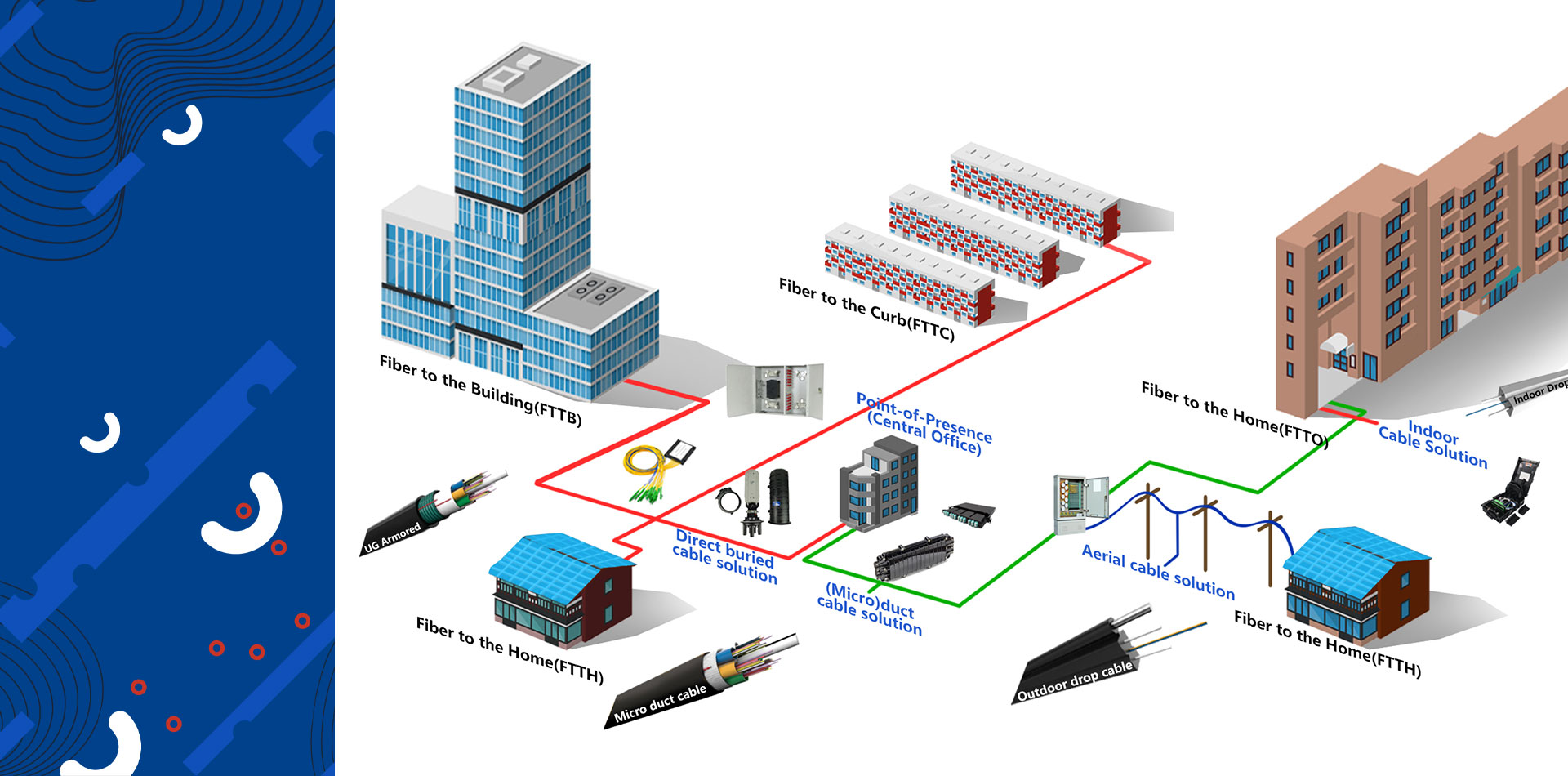GPON vs EPON, ¿cuál es la diferencia?
GPON (red óptica pasiva Gigabit) y EPON (red óptica pasiva Ethernet) son dos tecnologías destacadas en el ámbito de las redes de fibra óptica, cada una con características, ventajas y aplicaciones distintas. A continuación se muestra una comparación detallada de estas tecnologías.
Descripción general de GPON y EPON
GPON: Desarrollado bajo los estándares ITU-T G.984, GPON está diseñado para la transmisión de datos de alta velocidad utilizando el Modo de Transferencia Asíncrona (ATM) para voz y Ethernet para datos. Por lo general, admite velocidades de bajada de hasta 2,5 Gbps y velocidades de subida de 1,25 Gbps.
EPON: regido por los estándares IEEE 802.3, EPON utiliza paquetes Ethernet para la transmisión de datos, lo que le permite ofrecer anchos de banda simétricos de 1 Gbps o más, y las versiones más nuevas admiten hasta 10 Gbps.
Diferencias clave de GPON y EPON
1. Protocolo de transmisión de datos
GPON emplea ATM para voz y Ethernet para datos, lo que puede complicar la arquitectura debido a la necesidad de encapsulación.
EPON utiliza un protocolo Ethernet más simple, lo que lo hace más sencillo para servicios de solo datos.
2. Ancho de banda y velocidad
GPON proporciona mayores capacidades de ancho de banda con hasta 2,5 Gbps de bajada y 1,25 Gbps de subida, lo que lo hace adecuado para aplicaciones que necesitan un ancho de banda significativo.
EPON, aunque normalmente ofrece velocidades más bajas (1 Gbps simétrico), puede alcanzar velocidades más altas con estándares más nuevos (hasta 10 Gbps), pero su capacidad operativa estándar es menor que la de GPON.
3. Escalabilidad y alcance
GPON puede admitir hasta 128 unidades de red óptica (ONU) por terminal de línea óptica (OLT) con un alcance de hasta 20 km.
EPON generalmente admite un máximo de 32 ONU por OLT, pero también puede alcanzar distancias de hasta 20 km, según el diseño de la red.
4. Costo e implementación
Los equipos GPON tienden a ser más caros debido a su arquitectura compleja y capacidades de mayor rendimiento.
A menudo se prefiere EPON por sus menores costos de implementación y tiempos de configuración más rápidos, lo que lo hace atractivo para redes más pequeñas o regiones donde existen restricciones presupuestarias.
5. Calidad de Servicio (QoS)
GPON incluye funciones QoS avanzadas que permiten a los proveedores de servicios gestionar la asignación de ancho de banda de forma eficaz entre diferentes servicios (datos, voz, vídeo).
EPON ofrece QoS básica pero carece de las amplias capacidades de gestión que se encuentran en GPON.
Conclusión de GPON y EPON
Tanto las tecnologías GPON como EPON tienen sus respectivas fortalezas y debilidades, lo que las hace adecuadas para diferentes aplicaciones. GPON es ideal para redes más grandes que requieren un gran ancho de banda y características QoS sólidas, mientras que EPON a menudo se elige para implementaciones sensibles a los costos donde se prioriza la simplicidad y la instalación rápida.
GPON y EPON, ¿cuál debería elegir?
Elija GPON si:
Necesita una red multiservicio capaz de manejar Internet, voz y vídeo con QoS.
Usted es un operador de telecomunicaciones o ISP que busca brindar diversos servicios con altas velocidades.
El presupuesto permite una configuración más compleja y escalable.
Elija EPON si:
Su red está basada principalmente en Ethernet y no requiere soporte multiservicio.
Es una empresa o una empresa que busca una solución rentable con menor latencia.
Necesita una configuración más sencilla y está centrado en ofrecer Internet de alta velocidad.
Pregunta relacionada
WiFi 6 vs WiFi 5: ¿Cuál debería elegir?
GPON ONT ONU y XPON: Tecnologías clave en redes de fibra óptica de alta velocidad
Hora de publicación: 08-nov-2024

